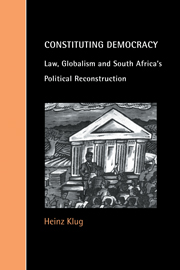Book contents
- Frontmatter
- Contents
- Acknowledgements
- Abbreviations
- Introduction
- 1 Post–Twentieth-Century Constitutionalism?
- 2 Legal Legacies and Constitutional Paths
- 3 Constitutionalism in Global Perspective
- 4 Constitutional Strategies
- 5 Constitutionalism in the Democratic Transition
- 6 Global Impact: International Imperatives and their Hybridization
- 7 The Constitutional Court and the Institutional Dynamics of Constitutionalism
- 8 Constitutional Imaginations and the Possibilities of Justice
- Conclusion
- Notes
- Bibliography
- Index
Conclusion
Published online by Cambridge University Press: 06 July 2010
- Frontmatter
- Contents
- Acknowledgements
- Abbreviations
- Introduction
- 1 Post–Twentieth-Century Constitutionalism?
- 2 Legal Legacies and Constitutional Paths
- 3 Constitutionalism in Global Perspective
- 4 Constitutional Strategies
- 5 Constitutionalism in the Democratic Transition
- 6 Global Impact: International Imperatives and their Hybridization
- 7 The Constitutional Court and the Institutional Dynamics of Constitutionalism
- 8 Constitutional Imaginations and the Possibilities of Justice
- Conclusion
- Notes
- Bibliography
- Index
Summary
The Constitutional Court's decision, in September 1996, to deny certification of the first text of South Africa's final Constitution, epitomized South Africa's surprising post-colonial turn. Instead of following in the tradition of African decolonization and granting government nearly untrammeled legislative authority – whether in the form of Westminster democracies, Leninist-party states, military dictatorships or African socialisms – South Africa has embraced judicial review. The embrace of a constitutional form which limits government and aims to circumscribe pure majoritarian democracy is a particularly surprising outcome given more than 300 years of racial domination and the struggle for popular democracy which have engraved the landscape of South Africa's recent history.
The Constitutional Court's certification judgments represented the crest of the wave of a legal revolution which flowed out of South Africa's remarkable democratic transition. The judgments provided a window through which it was possible to view the emerging shape of a post-apartheid constitutionalism. This new constitutionalism – reflected also in other judgments of the Constitutional Court and the Court's engagement with other political institutions – is the product of, and bears the indelible mark of, South Africa's particular democratic transition. At the same time, the success of this new constitutionalist project has been reinforced by the Constitutional Court's own judicious politics. The Court has repeatedly asserted its right to decide central questions of governance, while simultaneously limiting its role to a clearly specified judicial function which pays open respect and deference to the new democratic institutions and processes.
- Type
- Chapter
- Information
- Constituting DemocracyLaw, Globalism and South Africa's Political Reconstruction, pp. 178 - 182Publisher: Cambridge University PressPrint publication year: 2000

